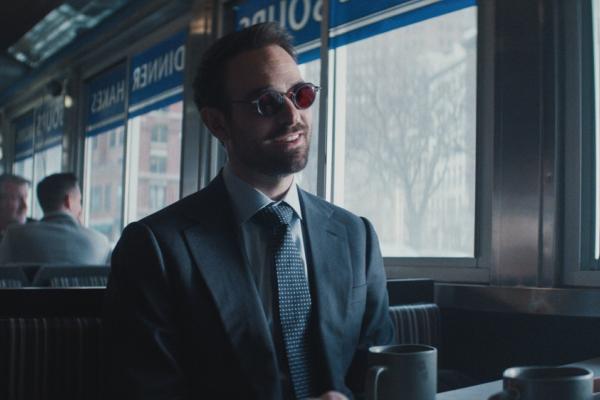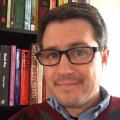This article contains spoilers for Daredevil: Born Again.
A masked killer known only as Muse stands over his victim, preparing to drain the blood from her veins. For weeks, Muse (Hunter Doohan) has been stalking the streets of New York City, turning dozens of innocent people into materials for his profane form of protest art.
But a noise draws Muse away from his ghastly work. He looks down a tunnel to see a figure emerging from red-tinted smoke, a figure getting rapidly closer. The figure dives toward Muse and delivers a punch across his chin. Viewers want to get up and cheer.
Daredevil is back. But is that a good thing?
Up from the depths
Most people watching the Disney+ show would answer with an unequivocal “Yes!” After all, we’re watching a show called Daredevil: Born Again. We want to see Daredevil, the superhero who has been making his slow return to the Marvel Cinematic Universe since his Netflix series was canceled after three seasons in 2017.
Born Again opens by bringing back the central members of the Netflix series cast, including Charlie Cox as blind lawyer Matt Murdock, Elden Henson as his best friend and partner Foggy Nelson, and Deborah Ann Woll as his love interest and other partner Karen Page. Within minutes, they’re attacked by the super-assassin Bullseye (Wilson Bethel) and Matt changes into Daredevil to fight back. But he’s not quick enough to stop Bullseye from killing several innocents, including Foggy. After Matt tries to kill Bullseye in retaliation, he decides to put his vigilante days behind him and seek justice through the law instead of through fighting on rooftops.
To put it another way, Matt decides that vigilantism has failed and it’s time to put his faith in the law. Yet, each episode of Born Again has put that faith to the test — with decidedly mixed results. Throughout the series, Matt crosses paths with police officers who use their badges to brutalize innocents. Matt successfully defends neighborhood protector Hector Ayala (Kamar de los Reyes) against murder charges incurred after he stands up to the cops, only for the police to extrajudicially execute Hector immediately afterward. Matt does pro bono work for a man (Charlie Hudson III) who is repeatedly jailed for petty crimes that the arresting officers also commit.
Worst of all, Matt’s archenemy Wilson Fisk (Vincent D’Onofrio), the Kingpin of Crime, becomes the duly elected mayor of New York City after running on a platform of disruption against unpopular, established politicians. Fisk uses his position to consolidate more power, embarking on a construction project that will help his businesses and using city resources to punish his personal enemies.
In the season premiere, Matt had hoped that the system would do its work. In an unusual confrontation between the two men, Matt and Fisk sit down at a diner for a civilized chat. “A rich man, by his very nature is self-serving,” declares Fisk. “But a mayor serves his city.” Citing his belief in divine grace, Matt ends the conversation by choosing to accept Fisk at his word, promising not to hassle the new mayor. However, he also cites his belief in divine retribution, telling Fisk that the moment he crosses the line, “I’ll be there.”
The terms that the two men use reveal a lot about the systems they serve. Fisk, at least on the surface, understands the nature of his new role, claiming that he must put his city over himself. Despite the language of divinity invoked by Matt, he remains completely solitary when he talks about his work as Daredevil. Vigilantism is a lonely and fundamentally selfish job. The law is communal, with no room for individual interest.
With his new law practice and new romantic relationships, Matt wants to be part of the community. But it’s his individualism that drives him to visit another Marvel superhero several episodes later. As seen in Season 2 of the Netflix Daredevil series, Frank Castle suffered his own tremendous loss when his wife and children died in a shootout between rival gangs. In that season, and in two seasons of the Netflix spin-off The Punisher, Frank sought redemption through vengeance, killing criminals to prevent his suffering from happening to anyone else.
In previous interactions, Matt rejected Frank’s methods as brutal and fundamentally unjust, claiming that no one man has the right to sentence someone to death. But when Matt visits Frank in Born Again — his suspicions sparked by a Punisher logo on the bullet that executed Victor — he finds himself being questioned again.
“You wanna know what I think, Red?” barks Frank, who actor Jon Bernthal plays as a bundle of raw nerves and damaged thoughts, held together by tactical gear. “I don’t think you came here for answers. I think you came here for permission.”
Permission for what? Permission to be like Frank — to put on a costume and seek justice by himself. Permission to stop pretending that he can achieve anything by practicing law, not when everyone from the police to Wilson Fisk knows the law is just a bludgeon they use against the vulnerable.
The community of saints
Even Christian viewers who find Frank’s methods repugnant have a hard time dismissing his argument. Daredevil: Born Again showrunner Dario Scardapane, who took over the series from Matt Corman and Chris Ord, doesn’t overstate the show’s real-world connections, but he doesn’t have to. Just as in the show, police officers idolize the Punisher and use his logo on their gear, mythologizing the violent justice he represents. Just as in our world, a man-child gains office on the rhetoric of law and order, promising to use his office to punish some vaguely defined enemy and restore an even less defined era of greatness.
Because of those real-world connections, Christian viewers cannot simply cheer Matt’s decision to become Daredevil again as superhero escapism. We cannot cheer his return to vigilantism, and the show doesn’t want us to. The series frames Matt’s decision to put on the mask again as a loss of faith, as a sort of wrongdoing. It frames his decision as backsliding, to use a religious term that’s appropriate for Matt, a devout if imperfect Catholic.
Matt begins Episode 6, in which he finally puts on the costume, reciting the Litany of St. Yves, the Patron Saint of Lawyers. “O God, from whom cometh all that is right and just,” Matt prays, “thou didst establish St. Yves as a judge amid his brethren, making him the friend and advocate of the poor.”
It’s hard to believe that Yves or any other saint would have imagined justice in the way that Matt enacts it, in part because Matt so often does it by himself, as if he alone determines guilt and innocence.
“The problem of violence today must be traced to its root,” writes Thomas Merton in Faith and Violence; “Not the small-time murders, but the massively organized bands of murders whose operations are global.” Because modern responses to violence are too often obscured by “archaic and mythical presuppositions,” Merton argues that we “tend to judge violence in the terms of the individual, the messy, the physically disturbing, the personally frightening. The violence we want to see restrained is the violence of the hood waiting for us in the subway or the elevator,” which blinds us to “the far greater problem of the more abstract, more global, more organized presence of violence on a massive and corporate pattern … white-collar violence, the systematically organized bureaucratic and technological destruction of man” (emphasis original).
Ever the contemplative, Merton offers no easy answers for what to do in response to this greater source of violence. He urges readers to search their hearts instead of loudly committing to causes. He points out that Christians often call for the oppressed to refrain from violence but ignore the oppressor.
But throughout his wrestling with the question, in his appreciations of Simone Weil and Buddhist monk Thích Nhất Hạnh, Merton repeatedly directs us away from individual forms of seeking justice, which so often become prideful, and toward those that rely upon others. “The non-violent register is not fighting simply for ‘his’ truth or for ‘his’ pure conscience, or for the right that is on ‘his side,’” writes Merton, rejecting the emphasis on personality so often associated with real and fictional vigilantes. “On the contrary, both his strength and his weakness come from the fact that he is fighting for the truth, common to him and to the adversary, the right which is objective and universal. He is fighting for everybody.”
In other words, Merton points out that selfishness can corrupt the search for justice, turning it into a personal vendetta and an excuse for violence. Through community, the search for justice acknowledges the good shared by all of us and seeks redemption and reparation over retribution.
Even though he doesn’t realize it, Matt acknowledges this community during the Litany of St. Yves when he prays, “Do thou make us, by his intercession, steadfast in the pursuit of justice and confident in thy merciful goodness” (emphasis mine).
Redemption through many
We didn’t realize it, but Daredevil: Born Again has been preparing us viewers to think of justice in communal terms as well. Sprinkled throughout the first season are segments of the The BB Report “man on the street” style interviews hosted by young reporter BB Urich (Genneya Walton). At first, these reports just seem to function like a classical chorus, showing us what the regular New Yorker thinks about Wilson Fisk, Muse, and the return of Daredevil.
But by the final episode, their true purpose becomes clear. The New Yorkers we’ve seen on The BB Report throughout the season, people who have expressed radically different viewpoints and come from radically different backgrounds, become mobilized by Fisk’s declaration of an anti-vigilante bill. Directors Justin Benson and Aaron Moorhead cut between Fisk’s press conference — an all-consuming, self-righteous rage after an attempt on his life in the previous episode — and New York citizens realizing the authoritarian reach. The anger and frustration that led many of them to cheer Fisk on during the celebrations and rallies they held earlier in the season turns to fear as they realize they may become oppressed now too.
So, when Daredevil emerges from a building, beaten and bloody after fending off Fisk’s anti-vigilante police force, manned entirely by corrupt cops, he looks as heroic as ever. But he no longer looks alone. We see people standing by him — his old friend Karen Page and his unexpected ally Frank Castle — as well as many of the citizens who showed up in The BB Report.
In these shots, we see the common humanity that Merton describes as the object of the non-violent resister, we see the supplicants described in the Litany of St. Yves.
It’s in this moment that Daredevil finally becomes born again, repenting from the sin of individualism and turning to the blessing of the community, seeking justice not by himself, but through the whole of humanity.
Got something to say about what you're reading? We value your feedback!







